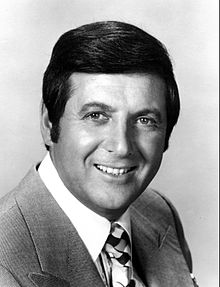The Monty Hall problem
It’s

and here’s your host

!!! MONTY HALL !!!
In Monty Hall’s game show you are the contestant.
In this puzzling game there are three doors to rooms at the back of the stage and you are told that behind one of them is a prize and the other doors lead to empty rooms.
You are asked to choose a door but not open it. If you pick the door with the prize, you ultimately win it, if it turns out to be empty you lose. Then Monty, who knows where the prize is, opens an empty door. He then offers you the chance to switch doors or stick with the one you first picked.
Should you switch? The answer must be YES, NO or IT DOESN’T MATTER.
Hint: Remember it’s a probability puzzle.
Answer
The intuitive answer is that IT DOESN’T MATTER because the odds are equally 1 in 2 or 50 / 50 for each of the closed doors. However the correct answer is YES, you should change your choice because you are twice as likely to win the prize. But why? Even mathematicians struggled with this one.
At the start you have a 1 in 3 chance of picking the right door. But, when you see the
first empty room, it does not alter the odds to 1 in 2 for each door as seems logical
but 2 chances in 3 for the door not chosen.
There are two situations. Your first choice was right or your first choice was wrong. In the first situation you would be wrong to change your mind, in the second you would be right to change your mind. However you are twice as likely to be in the second situation as in the first situation.
Here is a simple simulation to try out a few hundred times either changing or sticking with your first choice. You should find that changing your choice wins the car most times.
The backstory
Monty Hall pointed out the psychological factors which were a major part of his TV game show.
Opening a door puts pressure on the contestant who thinks that the odds on the chosen door
hiding the prize have gone up from 1 in 3 to 1 in 2 so it is sensible not to change. Also
Mr. Hall did not have to offer a switch according to the rules of the show and he
usually didn’t offer it. He had another possible tactic.
Whenever the contestant began with the wrong door, Mr. Hall promptly opened it and
the contestant lost; whenever the contestant started out with the right door, Mr. Hall
allowed him to switch doors and lose! More bizarre he sometimes offered increasing amounts of
money to switch or not in order to jazz up the game.
The more elegant original puzzle was formulated by Joseph Bertrand in 1889. In this puzzle there
are three boxes, one holds two gold coins, one a gold and a silver and one has two silver coins.
After choosing a box at random and taking out one coin without looking, which happens to be a
gold coin, what are the odds that the other coin is also a gold one? The answer again is 2 in 3, not 1 in 2.


